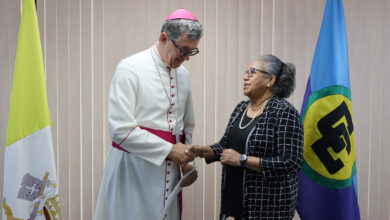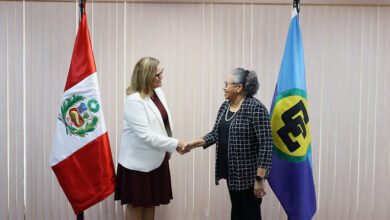(CARICOM Secretariat, Turkeyen, Greater Georgetown, Guyana) The co-ordination of foreign policy by Member States of the Caribbean Community (CARICOM) has served to help the Region make its mark in the global arena as a key player in international diplomacy.
This was underscored by Secretary-General of the Caribbean Community H. E Edwin Carrington as he addressed CARICOM Diplomats at the opening ceremony of a two week Diplomatic Training Programme in Georgetown, Guyana. He told the regional diplomats that Foreign Policy co-ordination was one of the pillars of the Community, and it was one through which the Region had gained much respect.
“Indeed one may be justified in claiming as I did in Jamaica in addressing the recent 12th meeting of the Community’s Council for Foreign and Community Relations that more than any other it is this pillar that truly stamps us as a Community. For it is the one that provides this grouping of small, vulnerable nation states with both the sword and the shield to carve out, protect and eventually broaden the space for its people in the global community,” the Secretary-General told the participants.
He told them that as future representatives of the diplomatic corps of the Caribbean Community they would be walking in the footsteps of some of the most eminent CARICOM diplomats, who had spent their careers defending and promoting the interest of Caribbean.
Speaking to an audience that included a host of serving and former Caribbean diplomats, such as the Honourable Sir Shridath Ramphal OCC, His Excellency Albert Ramdin, Assistant Secretary-General of the Organisation of American States and former Guyanese Foreign Minister Rashleigh Jackson, the CARICOM Secretary-General highlighted the rich history of successful CARICOM diplomacy which he said illustrated the fact that size had no relation to skill.
“It was Caribbean diplomats who were, for example, at the forefront of the historic signature of the Georgetown Accord that established the African Caribbean and Pacific Group of States (ACP). They helped to spearhead the conclusion of the historic Lomé Conventions which created the most advanced trade and development relationship of its time between former colonies and colonial powers. These Conventions were succeeded by the Cotonou and Economic Partnership Agreements,” Mr Carrington said.
He also informed that Caribbean diplomats played an active role in the struggle “against the regimes that shamed our collective humanity in Southern Africa”. Mr Carrington reminded that it was Caribbean diplomats too who were at the forefront in this hemisphere to recognise Cuba at the height of the Cold War. He stressed that the work of the Caribbean served to pave the way for other countries of Latin America to do likewise.
“They (Caribbean Diplomats) are also integrally involved in the fight to get the international community to recognise the special circumstances of small vulnerable economies and to accept that small states should not be marginalised in today’s rapidly evolving socio-economic and geo-political landscape. Caribbean diplomacy has therefore, made an indelible mark in Africa, Latin America, and the wider world,” Mr Carrington stressed.
The two week training programme for Mid-Career Diplomats is hosted by the CARICOM Secretariat, in partnership with the Commonwealth Secretariat and the Institute of International Relations (IIR) of the St. Augustine campus of the University of the West Indies.





